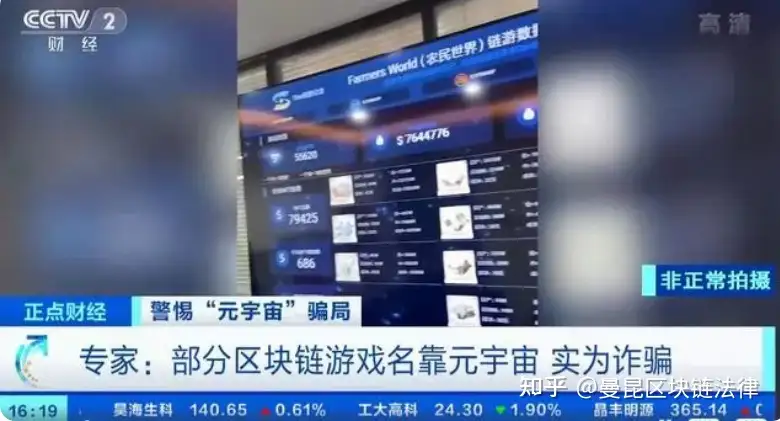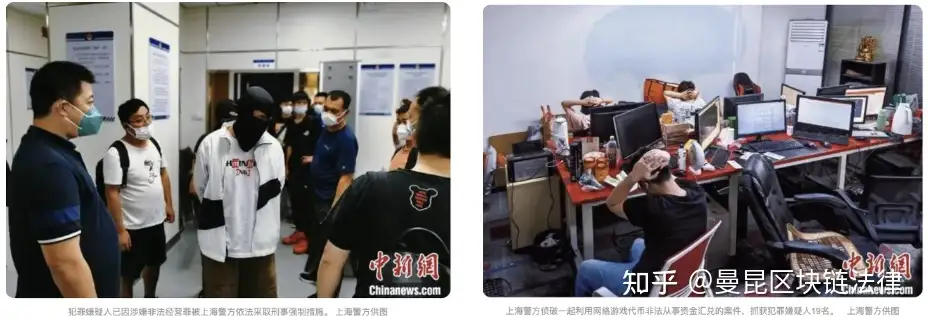What are the legal risks of blockchain games in the new trend of NFT digital collections?
Legal risks of blockchain games in the NFT digital collections trend.Recently, several mainstream digital asset platforms have started to layout or have already launched blockchain games with their own platform assets as the theme, such as HOTDOG, Shiba Inu, etc. It seems that blockchain games have become the next trend in the digital asset industry. If we want to develop and operate blockchain games in China, we need to understand the current regulatory situation and potential legal risks.
01 The Current Regulatory Situation of Blockchain Games in China
As of now, although China has not established a dedicated legal regulatory system for blockchain games, the regulatory attitudes towards the elements included in current domestic blockchain games, namely blockchain technology and online games, are relatively clear.
1. Regulation of Blockchain Technology in China
Firstly, China currently has a relatively positive attitude towards blockchain technology as a whole. For example, in June 2021, the Ministry of Industry and Information Technology and the Cyberspace Administration of China jointly issued the “Guiding Opinions on Accelerating the Application and Development of Blockchain Technology,” which pointed out the need to promote the integration and development of blockchain with new-generation information technologies such as the Internet, big data, and artificial intelligence, and construct an advanced blockchain industry system.
Secondly, China has adopted strict regulatory measures for virtual currencies and NFTs. On September 4, 2017, the People’s Bank of China and six other departments issued the “Announcement on Preventing Risks of Token Offering Financing,” defining ICOs as illegal public financing without approval, clarifying the non-monetary nature of tokens, and prohibiting the exchange, trading, pricing, and information intermediary services of various token exchanges. On August 24, 2018, the China Banking and Insurance Regulatory Commission and five other departments issued the “Risk Warning on Preventing Illegal Fundraising Risks in the Name of ‘Virtual Currency’ and ‘Blockchain’,” emphasizing that some illegal elements use the banner of “financial innovation” and “blockchain” to absorb funds through the issuance of so-called “virtual currencies,” “virtual assets,” “digital assets,” etc., infringing on the legitimate rights and interests of the public. On May 18, 2021, the China Internet Finance Association, China Banking Association, and China Securities Association issued the “Announcement on Preventing Risks of Virtual Currency Trading Speculation,” clarifying the need to correctly understand the nature and attributes of virtual currencies, and engaging in illegal activities using virtual currencies may involve crimes such as illegal fundraising, illegal issuance of securities, and illegal sale of token tickets. On April 13, 2022, the China Internet Finance Association, China Banking Association, and China Securities Association issued the “Initiative on Preventing Financial Risks Related to NFTs,” which listed direct or indirect investment in NFTs and providing financing support for NFT investments as prohibited activities.
- Is NASA interested in crypto too? Their own researchers are testing blockchain storage on the moon base.
- Celestia, a modular blockchain, launches its own cryptocurrency. Take a quick look at the airdrop details and token economy.
- Why is regulatory compliance considered the final step in decentralization for blockchain?
In summary, currently, if we want to engage in the blockchain game industry in China, activities such as virtual currency issuance, speculation using virtual currencies and NFTs, or other financial activities are explicitly prohibited.
2. Regulation of Online Games in China
From the “Notice on Regulating the Order of Online Game Operation and Prohibiting the Use of Online Games for Gambling” issued by the Ministry of Culture, the Ministry of Public Security, and other departments in 2007, to the “Notice on Strengthening the Management of Virtual Currency in Online Games” issued by the People’s Bank of China and other departments in 2009, and to the “Notice on Regulating the Operation and Strengthening the Mid-term and Post-event Supervision of Online Games” issued by the Ministry of Culture in 2016, all emphasized that “it is not allowed to provide users with services to exchange virtual currency in online games for legal currency or physical goods.”
From this, it can be seen that China’s regulation of online games is constantly strengthening, especially when it comes to virtual currency. This is an area that needs to be paid attention to when developing blockchain games in China.
02 Legal Risks
Administrative Legal Risks
According to Article 7 of the “Regulations on the Administration of Internet Publishing Services” (hereinafter referred to as the “Management Regulations”) issued by the State Administration of Press, Publication, Radio, Film and Television and the Ministry of Industry and Information Technology, online games are classified as online publications. Enterprises engaged in the publication and distribution of online games must obtain an Internet publishing service license. According to Article 11 of the “Management Regulations,” before online games are published on the Internet, an application must be submitted to the provincial, autonomous region, or municipality directly under the central government’s administrative authority for press and publication. After approval by the relevant authority, it should be submitted to the State Administration of Press, Publication, Radio, Film and Television for approval. This is the pre-approval process for the publication of online games, commonly known as the “game version number.” Once a publication without a version number charges fees, it can be considered as illegal. If the illegal income exceeds RMB 10,000, a fine of 5 to 10 times the illegal income may be imposed. If the illegal income is less than RMB 10,000, a fine of up to RMB 50,000 may be imposed. In serious cases, criminal liability may also be incurred.
According to the “Administrative Measures for Internet Information Services,” enterprises engaged in operational internet information services should apply for an Internet information service value-added telecommunications business operation license from the provincial, autonomous region, or municipality directly under the central government’s telecommunications management authority or the competent department of the State Council for information industry. Otherwise, the telecommunications management authority of the provincial, autonomous region, or municipality directly under the central government may order rectification within a time limit. If there are illegal gains, the illegal gains will be confiscated, and a fine of three to five times the illegal gains will be imposed. If there are no illegal gains or the illegal gains are less than RMB 500,000, a fine of more than RMB 100,000 and less than RMB 1,000,000 may be imposed. In serious cases, the website may be ordered to be shut down.
In summary, for blockchain game developers and operators, conducting legal and compliant operations on the Internet requires obtaining an Internet publishing service license, a game version number, and an Internet information service value-added telecommunications business operation license. Otherwise, they may be subject to administrative penalties.
Criminal Legal Risks
- Fraud
In 2021, the CCTV Finance Channel reported a news story titled “Beware of the ‘Metaverse’ Scam.” In the report, a company in Fuzhou claiming to be the Metaverse Research Institute stated that players participating in their blockchain game “Farmers’ World” could invest and make money by buying equipment. To participate in this blockchain game, players first need to convert RMB into the virtual currency USDT, and then convert it into the virtual currency used in the game. Playing the game can generate a monthly investment return of nearly 100%. The staff introduced that the game can generate daily profits of 3,000 to 4,000 yuan and claimed that no customers have lost money in the game. In addition, to make investments, players must first receive guidance from the company and pay a service fee of more than 6,000 yuan. They also need to share 20% of the monthly profits. In reality, this is a new type of scam disguised as the Metaverse. It is essentially a low-cost web game that claims to offer financial investment opportunities. In reality, it uses the funds paid by latecomers to fill the gap. Players not only cannot make money but also suffer significant losses from the service fees. It is essentially a classic Ponzi scheme.
 Organization and Leadership of Pyramid Scheme Activities
Organization and Leadership of Pyramid Scheme ActivitiesMany blockchain gaming projects require the purchase of platform tokens, props, etc. in order to participate in the game. If the project team uses pyramid scheme methods to develop game players, it is highly likely to be suspected of organizing and leading pyramid scheme activities, and there are indeed such cases in practice (Case No. 2021 Shanghai 0110 Criminal First Trial No. 1158).
Starting from 2020, Mou (handled separately) actually operated Guanjun Company, Leibei Company, and other companies in Yangpu District of a certain city, Hainan Province, Haikou City, etc., recruited employees, jointly developed and operated the “Bol World” APP, and used game projects such as “Millionaire Crocodile” and “Dig Dinosaurs Together” as bait, attracting others to register as members with high returns. The “Bol World” APP requires participants to download and register as members through an invitation code provided by their upline, and members are organized into upper and lower levels according to the order of recommendation, and they need to purchase and exchange digital currencies within the APP as a threshold to participate in the aforementioned games and obtain value appreciation of digital currencies. The “Bol World” APP provides three main ways of returns: static income, dynamic income, and team rewards, and directly or indirectly uses the number of personnel development and the amount of digital currency purchased as the basis for returns. According to the appraisal, the total number of levels of “Bol World” members exceeds 3, with more than 10,000 participants. During this period, the defendant Zhou served as the head of the customer service department and community department of Leibei Company, responsible for customer service and community coordination. The defendant Jiang served as a programmer of Guanjun Company, responsible for the development and maintenance of some backend programs. The court held that the defendants Zhou, Jiang, and others organized and led pyramid scheme activities under the guise of promoting sales of goods and other business activities, requiring participants to obtain membership qualifications through the purchase of goods, and forming levels in a certain order, and directly or indirectly using the number of personnel development as compensation or rebate basis, enticing participants to continue developing others to join, deceiving property, and disturbing the economic and social order. The circumstances are serious, and their actions have constituted the crime of organizing and leading pyramid scheme activities.
- Gambling Crime/Operating a Gambling House
If a certain blockchain game developer and operator develop a blockchain game virtual currency that accepts bets, participate in gambling lotteries, open chess and card gambling or blind box games with lucky draw elements, and players can not only use them to purchase equipment and props, but also exchange the obtained gold coins or props for RMB, then the essence is similar to gambling chips, and there is a high possibility that such blockchain games may be suspected of gambling crimes/operating a gambling house, and real cases do exist (Case No. 2018 Gan 0102 Criminal First Trial No. 585).
In the process of operating and managing the Chenlong game platform of Pangu Company, the defendants He and Li used the “Fishing” and “Gobang” games provided by the platform for gambling activities. In the “Fishing” game, the “players” (gamblers) consume virtual game coins by shooting fish with cannons, with each shot consuming 10-9900 game coins. If the fishing is successful, they will receive a return of 2-100 times the game coins, and then in the “Gobang” game, they will exchange the game coins for RMB through “silver merchants” (people engaged in online sales and repurchase of game coins).
The court holds that the defendants He and Li have used an Internet gaming platform to operate a casino, and their actions constitute the crime of opening a casino.
- Illegal operation/money laundering
If the developer or operator of a blockchain game platform builds the platform to facilitate the exchange of virtual currency or legal tender for money laundering activities or to assist money launderers in collecting or transferring funds, it is likely to involve the crimes of illegal operation and money laundering. There are also many real-life cases of this in practice.
In June 2022, the Economic Investigation Division of the Shanghai Public Security Bureau, together with the Baoshan Branch, conducted a comprehensive assessment of the virtual goods trading in online games and found that some trading merchants had a large amount of foreign funds transferred into their bank accounts, indicating that they were suspected of engaging in illegal RMB exchange business.
The police quickly formed a joint task force to initiate investigations, starting from suspicious fund accounts and tracing them layer by layer, leading to the discovery of several suspicious overseas websites and the identification of the actual operator of the websites, Shi. This also led to the discovery of several illegal online currency exchange platforms.

Investigations revealed that the criminal gang, led by suspect Shi, built overseas servers to establish illegal online currency exchange platforms without obtaining approval from relevant national authorities. They recruited domestic and foreign exchange customers and provided illegal currency exchange services by recycling and recharging various types of in-game tokens for others.
According to the police, the criminal gang had clear division of labor, with departments for management, operation, finance, and customer service. After receiving the customer’s currency, the gang used domestic and foreign in-game token acceptors to convert the currency into the foreign currency needed by the customer through multiple recharge and acceptance transactions. They then transferred the foreign currency to the customer’s designated account after deducting a fee ranging from 5% to 15%, thus providing illegal currency exchange services between domestic and foreign currencies.
In September 2022, Shanghai police, in cooperation with foreign exchange management authorities and with the strong support of police forces in other provinces and cities, arrested 19 suspects and dismantled four illegal online currency exchange platforms, with the amount involved reaching 14 billion yuan.
Other legal risks
Some blockchain games collect players’ personal information during registration or the gaming process. In this regard, developers and operators of blockchain games should pay attention to compliance with regulations such as the Data Security Law, the Cybersecurity Law, and the Personal Information Protection Law to prevent the risk of personal information leakage.
In most blockchain games, when players engage in actions such as copying virtual assets in the form of NFTs, such as characters and equipment, it may infringe upon the rights of copyright owners. Therefore, developers and operators of blockchain games also need to pay attention to whether the NFTs in the game have obtained authorization or usage permits from copyright owners, and whether there are risks of infringement of others’ copyrights or trademark rights.
03 Conclusion
In summary, the developers and operators of blockchain games are using blockchain technology to promote the transformation of traditional games and explore new gameplay, which is worth advocating. However, the legal risks faced by developers and operators of blockchain games in our country are relatively severe. Therefore, developers or operators of blockchain games should carefully set game rules and modes, thoroughly understand the regulatory policies and legal provisions for blockchain games in our country, and avoid unintentionally crossing the legal red line.
We will continue to update Blocking; if you have any questions or suggestions, please contact us!
Was this article helpful?
93 out of 132 found this helpful
Related articles
- SBF in the eyes of Western mainstream media Watch the BBC documentary ‘The Fall of the Crypto King’ in 5 minutes.
- How does composability enhance the openness of the autonomous world?
- Layer2 is just the beginning, Ethereum will devour all blockchains.
- Li Xiaolai endorses, Luo Yonghao invests, digging into the long-standing story behind Mixin
- Opinion Blockchain with paid usage will never achieve large-scale adoption.
- Comparing the current regulatory status of stablecoins in various countries and looking forward to future policy trends
- Opinion The blockchain industry is transitioning from narrative logic to application logic.






